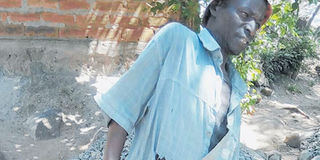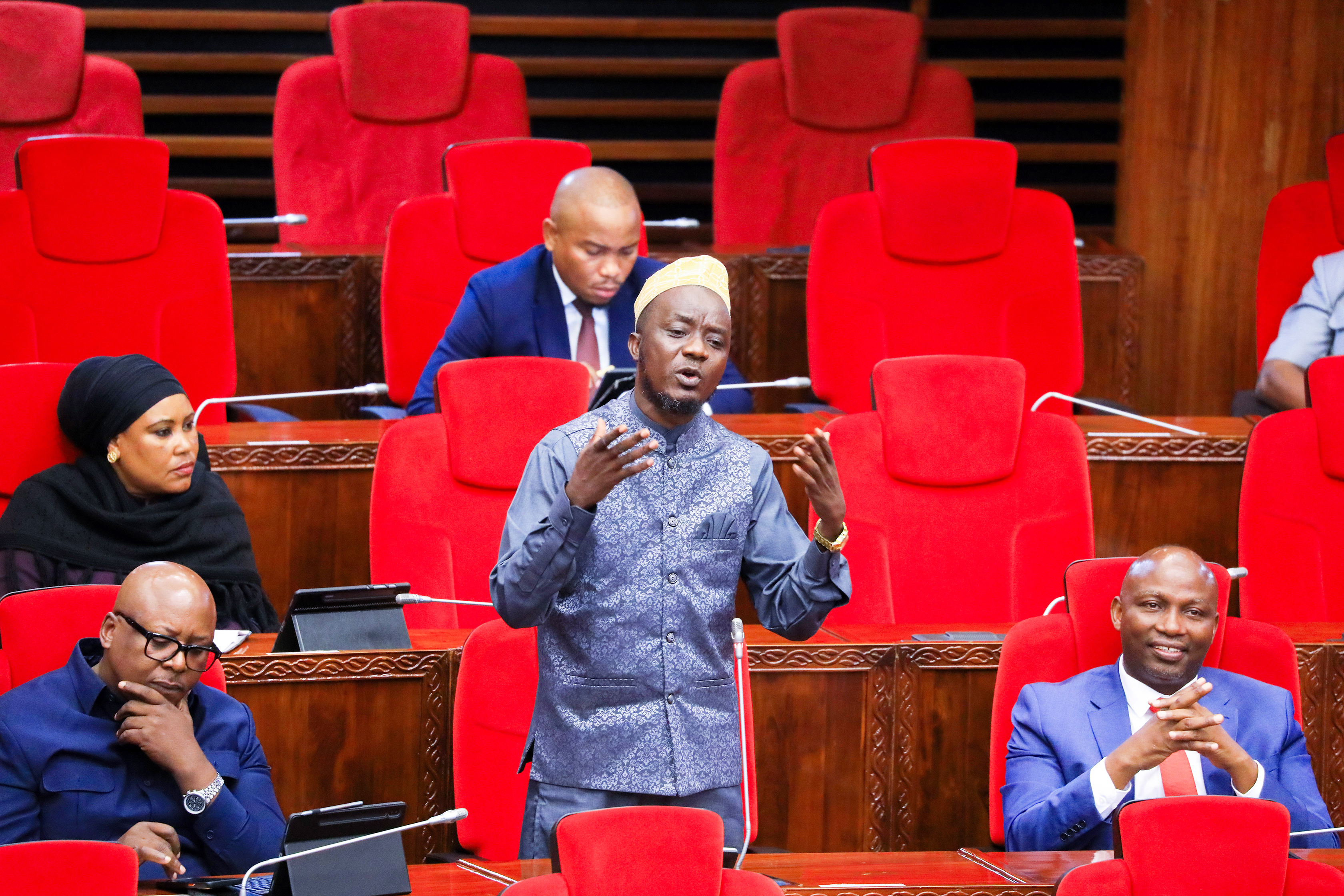Faridi lost his sight but not the vision to a full life

Faridi Shija busy crushing stones. He has managed to triumph despite losing his sight at the tender age of 8. PHOTOS | JONATHAN MUSA
What you need to know:
- But to some blind people, it does not matter especially when it comes to daily activities that would enable them to make ends meet. And this is why we bring you the story about 58-year-old Faridi Shija who has managed to triumph despite losing his sight at the tender age of 8.
Blindness is lack of vision. It may also refer to a loss of vision that cannot be corrected with glasses or contact lenses.
But to some blind people, it does not matter especially when it comes to daily activities that would enable them to make ends meet. And this is why we bring you the story about 58-year-old Faridi Shija who has managed to triumph despite losing his sight at the tender age of 8. From excavating and crushing rocks daily, he has managed to build a decent house, take his children to school, employ casual labourers and buy cows which give him enough milk to sell and generate more income. He also lends money to people in his community when they are in need.
He lost his eyesight at a the age of eight after suffering from measles. Coping with this situation did not cost him such much. Faridi, a father of six and a grand father of two says instead of lamenting about his situation, he has chosen to do something to bring food on his table.
Faridi who lives in Ibanda village, Ilemela District in Mwanza says struggling with life for about fifty years has never been easy since he did not even manage to attain education. As he got older, he had nothing to since no one would accept to give him any job given his situation.
He then chose to crush stones at a stone quarry in Ibanda village, Kirumba ward that is about a half a kilometre from where he lives. He says this job is what he does best.
“This is my life and I am doing it well. I can’t go to the streets to beg for money yet I have this job which has been supporting me all my life and my family. I am blind but happy with my job,” he says.
He says from his crushing stones, he has managed to take her children to school of whom, two are in secondary while three in primary and the youngest, still at home.
“I cannot leave this job because no one can heal a blind man but since I am very good at this job I am happy to continue doing it,” Faridi.
He says at times, he smiles and thank God particularly when some people come to borrow some money from him for it makes him feel valued.
“When people come to ask for financial assistant from me, I realize that I am valued in the society and not stigmatized,” he says smiling.
Although Faridi admits that he faces challenges in his trade, he says he has succeeded in many other ways.
“I managed to build my own house, educate my children and also support my family despite the challenges I face,” he said.
He sells one (heap) truck of concrete at Sh 200,000. He says he has created very big customer base and get many orders in advance.
With this kind of business he has managed for about fifteen years, he has employed casual labourers to help him for efficiency and timely service delivery.
“Converting stones into concrete is not as easy as one plus one, a lot of energy is consumed and determination here is the main secret. Due to its heavy task, you cannot get at least casuals who can last for long, they run away because of the nature of the activity here,” he stated.
He says, one may most likely think stone quarrying is a simple job to do but there are many challenges.
“When you tour the quarry, you will also discover it is a job that cuts across sexes and ages,” he said.
But the task is not simple at all. For instance the mechanism they use to excavate rocks from underground and crack them into small pieces is incredible, at least in this era.
They use a small flat metal, which they place under the rock and then hit it with a big hammer.
Timing is vital as well, because when one misses the head of the metal and hits the rock, the price can only be pain in their hands.
“Sometimes we hit our fingers with the hammers we use. It is a tiresome job. I don’t plan to leave it because it’s all I have got and I am getting older anyway,” he said.
He, however, explains that initially, it could take him a week to gather stones that fill a truck.
“If you work alone, it will take you about a week to crush stones that fill a truck. But since I employed casuals who assist me here, we can fill a truck within eight to ten hours,” he narrated.
Extracting rocks and breaking them into smaller construction materials (concrete) is a hard task.
Except for the rough methods they use, hot sun, or cold rains and lack of protective gears. The risk of death is eminent as the steep sides of the rock could collapse without warning and any time.
He tasked young men to stop waiting for the government to create employment for them yet they can create their own.
“You are young and strong why do you wait on government yet there are many things you can do to create employment. I am blind but you will never find me on streets begging and I will never be on streets.”
Faridi also has managed to buy himself five cows which he rears at home and also provide income to the family. “I get seven litres of milk in the morning which I sell to generate some income for my family,” he says.
According to Dr Magita Msenda, an ophthalmologist who runs an eye-care-center in Mwanza city, the number of blind people has kept on mounting high with various reasons.
He named, cataract (47.9%) as the leading cause of visual impairment in all areas of the world, except for developed countries.
Other causes of blindness included, glaucoma, corneal opacities, diabetic retinopathy, childhood blindness, trachoma and onchocerciasis.
“In the least-developed countries, and in particular Sub-Saharan Africa, the causes of avoidable blindness are primarily, cataract (50%), glaucoma (15%), corneal opacities (10%), trachoma (6.8%), childhood blindness (5.3%) and onchocerciasis (4%),” he said.
However, the Tanzania League of Blind (TLB) chairman in Mwanza region, Musa Kabwere says their aim is to promote the welfare of blind and visually impaired people in Tanzania, advocate for the education, rehabilitation, social services and equalization of opportunities for persons with disabilities and to change the attitude of the community towards blind and visually impaired persons.
He said extreme poverty among the society surrounding blind people has affected their standard of living. He rather informed that negative attitude is also another issue which hinders this group in the region and the country at large.
“Environmental factors have forced most of the blind people turn to beggars in various parts of the city,” he said.
He added that currently, TLB has five hundred members who are registered. Thank to government as it has begun supplying special equipment to blind people since March this year.
Email: [email protected]




